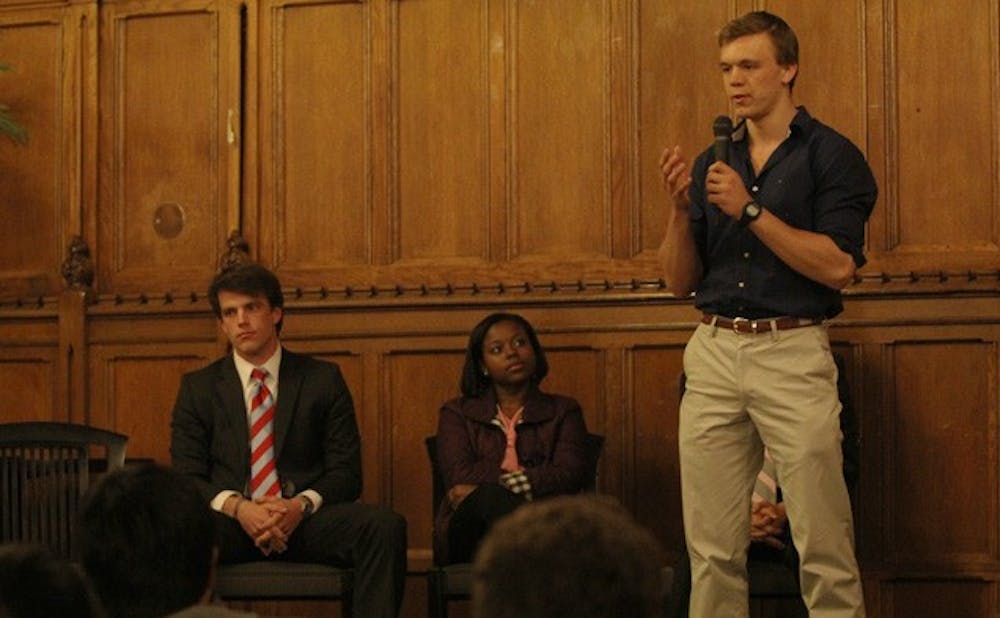The three candidates for Duke Student Government president went head to head Wednesday night in a debate that highlighted next year’s house model, West Union Building renovations and the lack of student communication with both DSG and the administration.
Juniors Chris Brown, external chief of staff; Alex Swain, vice president for Durham and regional affairs; and Strat Waldt, a senator for residential life and dining participated in the debate led by junior Cory Adkins, chair of The Chronicle’s independent editorial board. Sophomore Patrick Oathout, who is running unopposed for DSG executive vice president, also took part in the debate. Oathout currently serves as a senator for athletics, services and the environment. The election to select DSG’s president and executive vice president will take place April 12.
Many of the questions and answers prodded at the student body’s relationship with Duke’s administration, mostly criticizing administrators for leaving students out of critical decisions.
All three candidates pointed out the alterations to next year’s house model, the planning and execution of Football Gameday and the looming relocation of the Mary Lou Williams Center for Black Culture and the Center for Lesbian, Gay, Bisexual and Transgender Life as administrative actions that lacked student backing.
Brown noted a need for further student input in future developments on the upcoming West Union renovations. He said students need to be incorporated in discussions with the West Union architect in order for the building to truly serve as the heart of Duke’s campus and a hub for students.
The house model will also be important in shaping University culture for years to come, Brown noted.
“We are founding the communities that Duke students are going to experience for three years and that generations to come are going to see,” he said.
Swain said that DSG squandered an opportunity to take a larger role in campus discussions with administrators earlier this year. If elected DSG president, Swain said she would open up discussions to the wider Duke community and work harder to serve as an advocate for students.
“If students are upset about something, it’s our job to advocate,” Swain said. “This year, we could have acted sooner on the Mary Lou, the LGBT Center and on the issue of Football Gameday. We were cut out of the conversation.”
Waldt added that he hopes to help change this culture of disconnect and seek out student feedback for major University decisions, if elected DSG president. Waldt said he has an understanding of diverse student groups.
“What I’ve seen since my freshman year is that the administration has chosen to enact policy without student opinion,” he said.
As executive vice president, Oathout noted in his opening and closing remarks that he will work to make DSG more transparent. Oathout criticized the presidential candidates’ approach to the debate, and added that they took cheapshots at the administration as opposed to proposing concrete policy solutions to Duke’s problems.
In an interview following the debate, Oathout said running unopposed allowed him to tell the truth in his closing statement.
“It’s interesting that [the candidates] are willing to attack the administration, but they won’t attack each other,” Oathout said.
Current DSG President Pete Schork, a senior, said hearing the candidates’ ideas is important, but noted that he is more interested in outcomes.
“I don’t think the administration rewards ideas,” Schork said in an interview. “They reward solutions, and the community rewards people who are able to balance the very complex needs of a diverse array of constituencies.”
Get The Chronicle straight to your inbox
Signup for our weekly newsletter. Cancel at any time.

